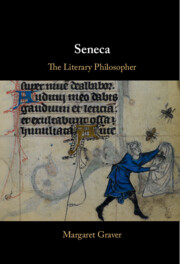Book contents
- Seneca
- Seneca
- Copyright page
- Contents
- Figures
- Preface
- Texts, Translations, and Abbreviations
- Introduction
- Part I Recreating the Stoic Past
- Part II Rival Traditions in Philosophy
- Part III Models of Emotional Experience
- Chapter 6 Seneca’s Therapy for Anger
- Chapter 7 The Weeping Wise
- Chapter 8 Anatomies of Joy
- Part IV The Self within the Text
- Bibliography
- Passages Treated
- Index
Chapter 6 - Seneca’s Therapy for Anger
from Part III - Models of Emotional Experience
Published online by Cambridge University Press: 23 March 2023
- Seneca
- Seneca
- Copyright page
- Contents
- Figures
- Preface
- Texts, Translations, and Abbreviations
- Introduction
- Part I Recreating the Stoic Past
- Part II Rival Traditions in Philosophy
- Part III Models of Emotional Experience
- Chapter 6 Seneca’s Therapy for Anger
- Chapter 7 The Weeping Wise
- Chapter 8 Anatomies of Joy
- Part IV The Self within the Text
- Bibliography
- Passages Treated
- Index
Summary
In the early treatise On Anger, Seneca struggles to reconcile what he thinks is required of a therapeutic treatise with the view of emotions to which he is philosophically committed. In book 1 and the first part of book 2, he states the Stoic position with great clarity: that anger, like any emotion, consists essentially in a judgment by the rational mind; that the moment this voluntary judgment has been made, anger becomes unmanageable; that involuntary corporeal responses (pre-emotions) that occur prior to that assent are not themselves anger. Even the contested passage in De ira 2.4 can be read consistently with Stoic orthodoxy if one recognizes that the “third movement” described there is a further response that goes on beyond anger, namely the impulses of post-rational feritas as described in 2.5. Seneca’s recommendations for the management of anger in the remainder of the book mainly accord with this theoretical framework, in that they concentrate on the period before assent. At one point in book 3, however, he does offer a stratagem for managing anger in full swing, in tension with his own theoretical position.
Keywords
- Type
- Chapter
- Information
- SenecaThe Literary Philosopher, pp. 135 - 159Publisher: Cambridge University PressPrint publication year: 2023

